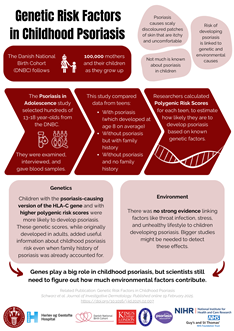06 May 2025
Genetic Risk Factors in Childhood Psoriasis - New Lay summary
Psoriasis is a skin condition that results in scaly, discoloured patches of skin that cause itch and discomfort. It occurs due to problems in the immune system, and these problems have been linked to both genetic and environmental causes.
A lot is known about psoriasis in adults, but not many studies have focused on psoriasis in children.
A new lay summary, produced by the St. John’s Institute of Dermatology focuses on a study on Genetic Risk Factors in Childhood Psoriasis. You can read the summary below.
Genetic Risk Factors in Childhood Psoriasis Study
The Psoriasis in Adolescence study looks at several hundred teenagers selected from the Danish National Birth Cohort, a large study that follows around 100,000 mothers and their children as they grow up. Teenagers ages 13-18 were examined, interviewed, and gave blood samples for genetic testing. For this study, researchers compared data from:
- Teens with psoriasis (which had developed at 8 years old on average)
- Teens without psoriasis but with a family history
- Teens without psoriasis and no family history
Like many diseases, psoriasis is not caused by one specific gene, but by the combined effect of many different genes that each contribute a little. In adults, the biggest contribution comes from a gene called HLA-C, which produces a specific protein that sits on the surface of cells and interacts with the body’s immune system. Researchers also use something called a Polygenic Risk Score (PRS) to measure the combined effect across all known psoriasis genes. Researchers compared the HLA-C gene and the PRS between the groups of teens in the Psoriasis in Adolescence study. They found that:
- Genetics matter: Children with the psoriasis-causing version of the HLA-C gene (known as HLA-C*06:02) were more likely to develop psoriasis. Children with higher PRS were also more likely to develop psoriasis, and the genetic score added useful information about the risk even when children’s family history of psoriasis was already taken into account.

- Environmental factors: Throat infection, stress, and unhealthy lifestyle were considered as possible triggers for developing psoriasis, but the study did not find strong evidence implicating these causes. However, a bigger study might be needed to detect these effects.
The study concluded that psoriasis risk genes previously identified in adults also help predict psoriasis risk in children.
Still, more research is needed to understand how environmental factors interact with genetics to cause psoriasis in young people.
The full paper is available online at: https://doi.org/10.1016/j.jid.2025.02.007